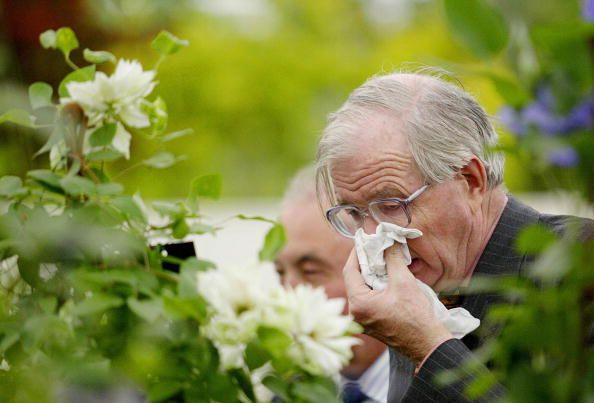What Is Hay Fever? Symptoms, Treatment, Disease Prevention And Myths

Hay fever, unlike what its name suggests, has nothing to do with hay. It is essentially an allergic reaction to outdoor or indoor allergens, such as pollen, dust mites, and saliva shed by animals with fur or feathers that results in common cold-like symptoms.
According to Mayo Clinic, “Hay fever, also called allergic rhinitis, causes cold-like signs and symptoms, such as a runny nose, itchy eyes, congestion, sneezing, and sinus pressure.”
Since many of its symptoms (watery and red eyes; cough; itchy nose; swollen, blue-colored skin under the eyes; postnasal drip; and fatigue) may last up to as long as one is exposed to the allergens, it is often difficult to differentiate between a common cold and hay fever. The only difference between the two is that the latter is not caused by a virus and does not include fever as one of the symptoms.
A health survey conducted in 2017 by the Centers for Disease Control and Prevention showed that about 19.9 million people in the United States were affected by hay fever in a year. Here are some measures that one can follow to avoid getting affected by the allergens.
1. People with asthma who live near areas with high concentration of pollen in the air can start using nasal sprays. One can visit sites like Pollen.com to find out what the pollen count is at one’s state at any given time of the year.
“Pollen can be an allergic trigger for those with asthma. Managing hay fever symptoms is an important part of keeping asthma under control,” Glenis Scadding, a consultant allergist at the Royal National Throat, Nose and Ear hospital, London, told the Guardian.
2. Steps can be taken to avoid bringing pollen inside the house. One can change clothes or shower, as well as bathe pets, after taking walks outside when the pollen count is higher. Since the pollen count is highest early in the morning, windows should be kept shut at those times and clothes should not be kept out to dry in the open. One should also avoid keeping fresh flowers inside the house and walking on newly cut grass.
3. Avoid stress, either by engaging in daily exercise and healthy eating habits, or taking up meditation.
“Stress can make the allergic response worse. We don’t know why exactly, but we think stress hormones can ramp up the already exaggerated immune-system response to allergens,” Dr. Ahmad Sedaghat, an ear, nose and throat specialist at Massachusetts Eye and Ear Infirmary, said.
While one takes every measure possible to prevent hay fever, it is also wise to educate oneself about some of the myths and facts surrounding the disease.
- Symptoms of hay fever do not always dissipate with age. It was found in a Swedish study that people showed decreased signs of the disease when they were in their 50s compared to when they were young. However, this is not always true, since there are people who never experienced the disease in their childhood who have gotten affected by hay fever as they grew older.
- Rain helps only a little in reducing the chances of hay fever. While this holds true for mild rain, it was seen that heavy rain had the opposite effect. When health insurance data was analyzed in South Korea, it was seen that outpatient visits to hospitals for allergic rhinitis rose after heavy rain or typhoons, BBC reported.
- Honey does not reduce symptoms of hay fever. In a limited study conducted by the National Library of Medicine National Institutes of Health in the U.S., some participants were given a tablespoon of pasteurized honey, while others were given unpasteurized honey or corn syrup artificially-flavored to taste like honey, on a daily basis. Neither of the groups experienced any relief from their symptoms.
Over-the-counter antihistamines can be taken to treat the disease. However, Nation Health Service officials in the United Kingdom advise against taking sedating antihistamines, which can impair driving and cognitive functions. A more severe form of hay fever can usually be treated by an intranasal steroid spray.
© Copyright IBTimes 2025. All rights reserved.






















